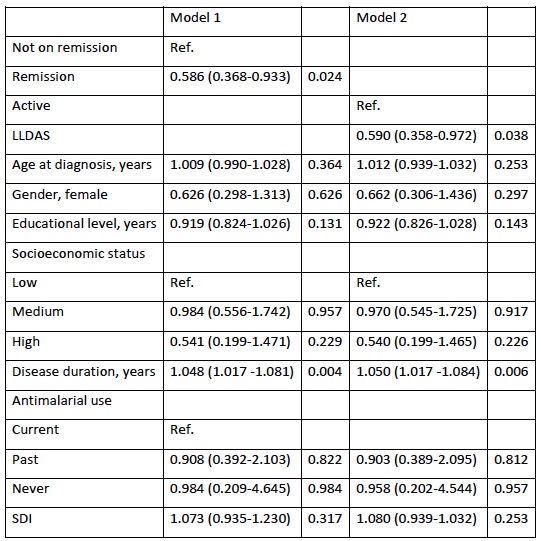Session Information
Date: Friday, November 6, 2020
Title: SLE – Diagnosis, Manifestations, & Outcomes Poster I: Clinical Manifestations
Session Type: Poster Session A
Session Time: 9:00AM-11:00AM
Background/Purpose: LLDAS and remission have been proposed as treatment goals for SLE patients. However, their impact on damage prevention in patients from Latin America has been scarcely evaluated. The aim of this study was to determine if achieving LLDAS or remission prevents the occurrence of damage accrual.
Methods: SLE patients from a single center cohort with at least two visits were included. Visits were performed every six months. Remission was defined as a SLEDAI-2k (excluding serology) =0, physician global assessment (PGA)< 0.5, prednisone daily dose≤5 mg/d and immunosuppressive drugs on maintenance dose. LLDAS was defined as a SLEDAI-2k≤4 with no activity in major organ systems, with no new features of lupus disease activity compared to the previous assessment, PGA≤1.0, prednisone daily dose≤7.5 mg/d and immunosuppressive drugs on maintenance dose. Damage accrual was ascertained with the SLICC/ACR damage index (SDI). Univariable and multivariable interval-censored survival regression models were used. Two models were done: 1. Remission vs Not on remission; 2. LLDAS/Remission vs Active. Possible confounders included in the multivariable analyses were gender, age at diagnosis, socioeconomic status, educational level, disease duration, antimalarial use and SDI. Confounders were determined at the same visit than disease activity state but the SDI was assessed at the subsequent visit.
Results: Two hundred and eighty-one patients were included, 260 (92.5%) were female, median age at diagnosis was 34.4 (25th-75th percentile: 27.1-42.4) and a median disease duration at baseline was 7.9 (25th-75th percentile: 3.9-12.8) years. Patients had median of 5 (25th-75th percentile: 2-6) visits and a median follow-up of 3.0 (25th-75th percentile: 1.8-3.5) years. Eighty-three patients (29.5%) increased their SDI during the follow-up. Based on remission, 580 visits (54.6%) were categorized as being on remission, 482 (45.4%) as not on remission. Based on LLDAS, 726 (68.4%) as being on LLDAS and 336 (31.6%) as active. In the analyses of remission, in the multivariable model, being on remission predicted a lower probability of damage (HR=0.586; 95%CI: 0.368-0.933; p=0.024). In the analyses of LLDAS, in the multivariable model, being on LLDAS predicted a lower damage (HR=0.590; 95%CI: 0.358-0.972; p=0.038). These analyses are depicted in Table 1.
Conclusion: LLDAS and Remission predicted less damage accrual. Although Remission is the desirable endpoint on the treatment of lupus, LLDAS also exerts some protective effect and thus could be an alternative endpoint in the management of these patients.
 Table 1: Impact of disease activity states on damage accrual. Multivariable models.
Table 1: Impact of disease activity states on damage accrual. Multivariable models.
To cite this abstract in AMA style:
Ugarte-Gil M, Gamboa-Cárdenas R, Reátegui-Sokolova C, Pimentel-Quiroz V, Medina M, Elera-Fitzcarrald C, Zevallos F, Pastor-Asurza C, Lofland J, Zazzetti F, Karyekar C, Alarcón G, Perich-Campos R. LLDAS (Low Lupus Disease Activity State) and Remission Prevent Damage Accrual in Systemic Lupus Erythematosus (SLE) Patients in a Primarily Mestizo Cohort [abstract]. Arthritis Rheumatol. 2020; 72 (suppl 10). https://acrabstracts.org/abstract/lldas-low-lupus-disease-activity-state-and-remission-prevent-damage-accrual-in-systemic-lupus-erythematosus-sle-patients-in-a-primarily-mestizo-cohort/. Accessed .« Back to ACR Convergence 2020
ACR Meeting Abstracts - https://acrabstracts.org/abstract/lldas-low-lupus-disease-activity-state-and-remission-prevent-damage-accrual-in-systemic-lupus-erythematosus-sle-patients-in-a-primarily-mestizo-cohort/
